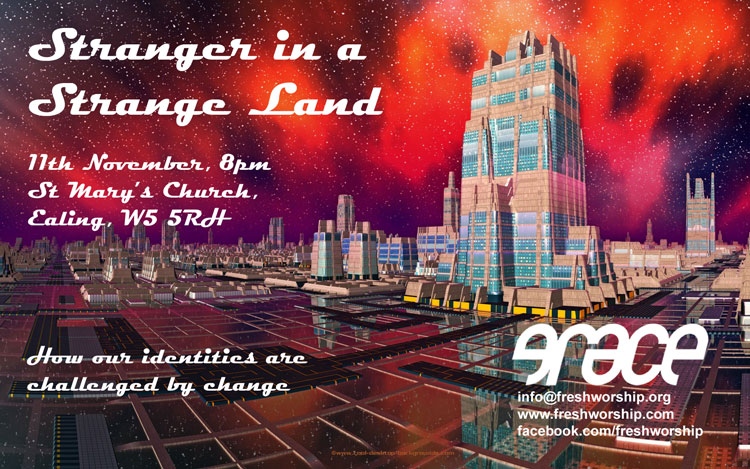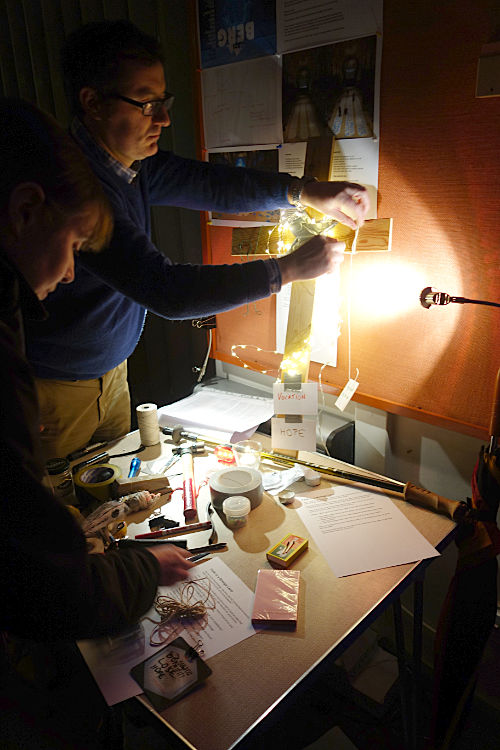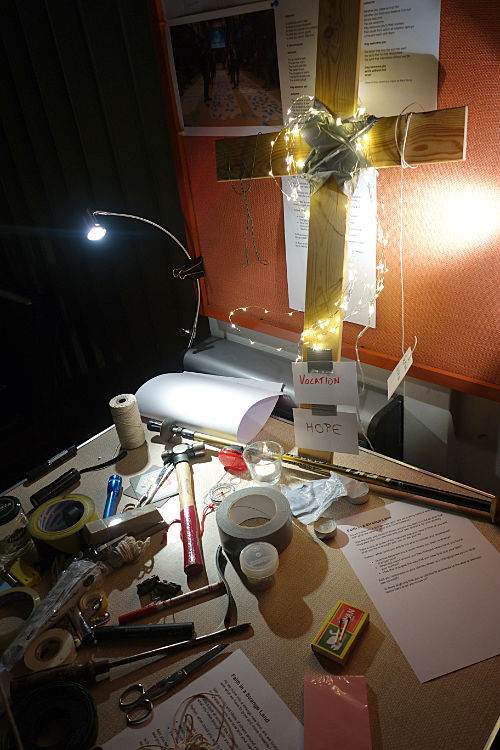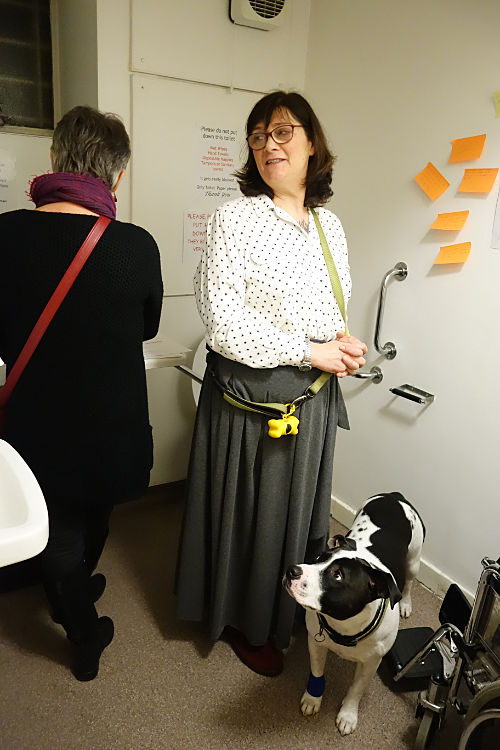November 2016: Stranger in a Strange Land

Intro:
With all the news on TV recently you may think it's about refugees tonight! In one sense it is and in another it isn't.
Story from friends living in a village in the Black Forest in Germany: told of an Afghan family who came to live in houses built in the village to welcome refugees into the community, how they had got to know the family and that the family had knocked on their door several times and delivered delicious central Asian meals. Even though the Afghans were disconnected from German culture around, they were starting to connect with it.
Tonight is about the challenge of being disconnected (as many refugees are) yet becoming connected (which is a challenge both for them and societies that welcome them), for example through sharing their food as in this picture. It's also the same with us when facing change. We may feel disconnected from what's happening around us and feel like withdrawing.
Brexit is a good recent example. Beforehand the Leavers felt disconnected from a European identity and expressed it in their vote. Nowadays the Remainers feel they have lost part of their European identity and are coming to terms with that. There was a similar situation in the States where many Trump supporters felt disconnected from the political establishment and now others feel disconnected from what Trump stands for. Should they try to connect? Those are examples of wider political changes affecting us but change can also be personal e.g. health, job, family.
Hence the subtitle to our time tonight: How does change challenge our identities? Later we will be unleashing you on some stations based on Israel's experience when they were taken into exile in Babylon from their homeland around 600 years before Christ. Israel traditionally believed that God resided in the Temple in Jerusalem so being in Babylon raised an enormous question for them: had their religion (and what made them unique) come to an end? We will see how they wrestled with change and maybe learn something about change in our own lives too.
But the first question is: what is our identity?
Identity page:
We would like you to create an Identity Page to take round the stations later.
- Grab paper and pens
- Draw / write on it to express aspects of your identity
- Examples could be nationality, hobbies, what you value
- It's just for you – you can share it later but ONLY IF YOU WISH
- Take it round the stations to use for reflection later
- You'll only have around 10 mins so don't make it a masterpiece!
[Before we had finished this section we were abruptly interrupted and made to leave the church, go outside and into the church hall.]
Look back in anger:
Look back into the main church again without going in. Use the binoculars if you wish.
How did it feel moving on without finishing? Would you like to go back? How does it feel that you can't?
With any changes, we all to want to look back, and not just for small changes like this. Sometimes it's external changes as with Brexit. Other times it's personal changes, such as jobs or health, or our living or family situations.
Are there good and bad ways to look back in those situations?
The Jewish people went through massive changes when taken into exile in Babylon around 600 BC. Not just disconnected from where they were but also from their identity as God's people in Jerusalem.
Have a look at the two psalms below, both written in Exile. Do you see them as good or bad ways of looking back? Is the fact that both are in the Bible helpful?
Psalm 137 vv5-9 (MSG)
Psalm 106 vv41-47 (MSG)
For reflection (and posting thoughts on wall if desired):
- What changes in your life have made you look back?
- What aspects of your identity did the changes affect?
- Has looking back been helpful?
Rivers of Babylon:
[Rivers of Babylon, originally by the Melodians, performed by Boney M, playing in the disabled toilet]
This is a pop song, but an unusual one in that all the words are taken directly from the Bible.
Psalm 137 was written in response to the Babylonian exile, in which Jerusalem was destroyed and many of its inhabitants taken into captivity. The Psalm has been used in many more recent struggles, such as the American Revolution, the Civil Rights Movement, and anti-colonial Jamaican Rastifari, which led to the song Rivers of Babylon.
We invite you to sing this song in the toilet – also a “strange land” in which to sing to God. To think about while you sing – do you associate God with a particular geographical location, as the exiled Jews thought of Zion? Or a particular spiritual location? Add this to your identity page, and/or write it on a Post-It on the wall.
Faith in a strange land:
As we move into a strange new land, are we looking back or working with what we have to grow and move forwards?
With the help and ideas of others around you start to build an altar that integrates who you are now and your own direction for your journey.
Take a look at some of the materials that you have in front of you and what you have brought with you on the journey.
Reflect, what could you add to the altar to include your experience?
- How has experiencing a world where you seem to be a stranger changed you?
- When the world around you has changed where have you found your comfort?
- Has this changed the way that you view God and your faith?
Add your responses to your identity sheet, is it changing how you or others see yourself?
Is there anything that you would like to contribute to the altar or perhaps leave behind as you move on?
Jeremiah 29 station:
Set up:
Sheets of plain paper on the walls
Marker pens
Tarpaulin, plant pots, compost, bulbs
Instructions
Instructions:
Seek the welfare of the city
- Are you rooted in your current neighbourhood or just passing through?
- How long do you think you will stay?
- How long do you think God wants you to stay?
Read the passage from Jeremiah 29 v 3-7 (on separate sheets of paper)
The letter was sent by the hand of Elasah son of Shaphan and Gemariah son of Hilkiah, whom King Zedekiah of Judah sent to Babylon to King Nebuchadnezzar of Babylon. It said: 4 Thus says the Lord of hosts, the God of Israel, to all the exiles whom I have sent into exile from Jerusalem to Babylon: 5 Build houses and live in them; plant gardens and eat what they produce. 6 Take wives and have sons and daughters; take wives for your sons, and give your daughters in marriage, that they may bear sons and daughters; multiply there, and do not decrease. 7 But seek the welfare of the city where I have sent you into exile, and pray to the Lord on its behalf, for in its welfare you will find your welfare.
On the wall note your best guess of how much longer you might be in your current neighbourhood- days, weeks, months or years?
Take one of the bulbs.
- Hold it in your hand – imagine all the potential beauty within
- Think of the places, people and events in your neighbourhood you would like to see flourish
- Plant the seeds in the pot as a sign of commitment in action and prayer.
On the wall write a prayer for your neighbourhood in the coming years whether you will be there or not.
Final words:
We have seen in the stations how Israel wrestled with the challenge of change in Babylon. Part of that was that they had lost their homes, livelihood, and possibly family members and had to change for the worse in Babylon. But a big part of the problem was this. They believed that they had left God behind in Jerusalem and that their religion that made them unique was in danger of dying out. Yet one person one day experienced a remarkable vision.
The prophet Ezekiel describes how he was on the bank of the Kebar River in Babylon and he had a vision of God something like this. It's one of the strangest chapters in the Bible and some commentators have tried to use it as an explanation for UFOs. God appeared to him in Babylon, but a lot of the imagery associated with it was the imagery of the Temple in Jerusalem, as if to say that God wasn't restricted to only being in the Temple.
It's similar for us trusting that God is there in the midst of change even when not appearing so. We can go through the same things that Israel went through – looking back in unhelpful ways, feeling we're not in the right place to experience God, wary to get involved in a new place which may be at the expense of old ways, especially when new ways don't make sense at first.
I'd like us to take some time to reflect, maybe write a letter to God asking for help and to post it to God at the place where changes we are experiencing or are facing is happening. I have envelopes, stamps.
Some questions you might ask while writing
Closing prayer
Photos
<< swipe left



